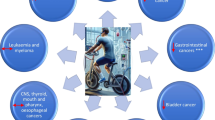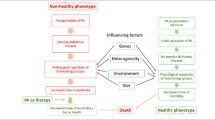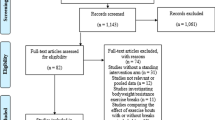Abstract
Background
In the field of exercise oncology, there is a need to quantify the potential benefits of moderate, self-directed physical activity during active treatment. In a pooled analysis of three identical single-arm intervention studies, we investigate the association of activity tracker steps with patient-reported toxicities during chemotherapy.
Methods
Women with early breast cancer who were enrolled in the intervention studies reported their symptom severity every 2–3 weeks throughout chemotherapy, and daily steps were documented through a Fitbit activity tracker. Relative risks (RR) and 95% confidence intervals (CI) were calculated using Poisson regression models with robust variance. For outcomes significant in unadjusted models, adjusted RRs were calculated controlling for race, age, and education level. Tracker step cut point (high step, low step) was determined by the means. Cumulative incidence functions of moderate, severe, and very severe (MSVS) symptoms were estimated using the Kaplan-Meier method and compared using a Cox proportional hazard model.
Results
In a sample of 283 women, mean age was 56 years and 76% were White. Mean tracker-documented steps/week were 29,625, with 55% walking below the mean (low step) and 45% above (high step). In multivariable analysis, high step patients had lower risk for fatigue [RR 0.83 (0.70, 0.99)] (p = 0.04), anxiety [RR 0.59 (0.42, 0.84)] (p = 0.003), nausea [RR 0.66 (0.46, 0.96)] (p = 0.03), depression [RR 0.59 (0.37, 0.03)] (p = 0.02), and ≥ 6 MSVS symptoms [RR 0.73 (0.54, 1.00)] (p = 0.05) and had 36% lower risk for dose reductions [RR 0.64 (95% CI 0.43, 0.97)] (p = 0.03).
Conclusion
Self-directed walking at a rate of at least 30,000 steps/week may moderate the severity of treatment side effects during chemotherapy for early breast cancer.
Trial numbers
NCT02167932, NCT02328313, NCT03761706.



Similar content being viewed by others
References
Ligibel JA, Bohlke K, May AM et al (2022) Exercise, diet, and weight management during cancer treatment: ASCO guideline. J Clin Oncol 40(22):2491–2507. https://doi.org/10.1200/jco.22.00687
Stout NL, Baima J, Swisher AK, Winters-Stone KM, Welsh J (2017) A systematic review of exercise systematic reviews in the cancer literature (2005-2017). PM R 9(9s2):S347–s384. https://doi.org/10.1016/j.pmrj.2017.07.074
Misiąg W, Piszczyk A, Szymańska-Chabowska A, Chabowski M (2022) Physical activity and cancer care-a review. Cancers. 14(17). https://doi.org/10.3390/cancers14174154
Loughney LA, West MA, Kemp GJ, Grocott MP, Jack S (2018) Exercise interventions for people undergoing multimodal cancer treatment that includes surgery. Cochrane Database Syst Rev 12(12):Cd012280. https://doi.org/10.1002/14651858.CD012280.pub2
van Vulpen JK, Sweegers MG, Peeters PHM et al (2020) Moderators of exercise effects on cancer-related fatigue: a meta-analysis of individual patient data. Med Sci Sports Exerc 52(2):303–314. https://doi.org/10.1249/mss.0000000000002154
Oberoi S, Robinson PD, Cataudella D et al (2018) Physical activity reduces fatigue in patients with cancer and hematopoietic stem cell transplant recipients: a systematic review and meta-analysis of randomized trials. Crit Rev Oncol Hematol 122:52–59. https://doi.org/10.1016/j.critrevonc.2017.12.011
Meneses-Echavez JF, Gonzalez-Jimenez E, Ramirez-Velez R (2015) Effects of supervised exercise on cancer-related fatigue in breast cancer survivors: a systematic review and meta-analysis. BMC Cancer 15:77. https://doi.org/10.1186/s12885-015-1069-4
Huizinga F, Westerink NL, Berendsen AJ et al (2021) Home-based physical activity to alleviate fatigue in cancer survivors: a systematic review and meta-analysis. Med Sci Sports Exerc 53(12):2661–2674. https://doi.org/10.1249/mss.0000000000002735
Wagoner CW, Lee JT, Battaglini CL (2021) Community-based exercise programs and cancer-related fatigue: a systematic review and meta-analysis. Support Care Cancer 29(9):4921–4929. https://doi.org/10.1007/s00520-021-06135-7
Medeiros Torres D, Jorge Koifman R, da Silva SS (2022) Impact on fatigue of different types of physical exercise during adjuvant chemotherapy and radiotherapy in breast cancer: systematic review and meta-analysis. Support Care Cancer 30(6):4651–4662. https://doi.org/10.1007/s00520-022-06809-w
Zhou HJ, Wang T, Xu YZ et al (2022) Effects of exercise interventions on cancer-related fatigue in breast cancer patients: an overview of systematic reviews. Support Care Cancer 30(12):10421–10440. https://doi.org/10.1007/s00520-022-07389-5
Fukushima T, Nakano J, Hashizume K et al (2021) Effects of aerobic, resistance, and mixed exercises on quality of life in patients with cancer: a systematic review and meta-analysis. Complement Ther Clin Pract 42:101290. https://doi.org/10.1016/j.ctcp.2020.101290
Buffart LM, Sweegers MG, May AM et al (2018) Targeting exercise interventions to patients with cancer in need: an individual patient data meta-analysis. J Natl Cancer Inst 110(11):1190–1200. https://doi.org/10.1093/jnci/djy161
Sweegers MG, Altenburg TM, Brug J et al (2018) Effects and moderators of exercise on muscle strength, muscle function and aerobic fitness in patients with cancer: a meta-analysis of individual patient data. https://doi.org/10.1136/bjsports-2018-099191
Courneya KS, Rogers LQ, Campbell KL, Vallance JK, Friedenreich CM (2015) Top 10 research questions related to physical activity and cancer survivorship. Res Q Exerc Sport 86(2):107–116. https://doi.org/10.1080/02701367.2015.991265
Lyman GH, Dale DC, Crawford J (2003) Incidence and predictors of low dose-intensity in adjuvant breast cancer chemotherapy: a nationwide study of community practices. J Clin Oncol 21(24):4524–4531. https://doi.org/10.1200/jco.2003.05.002
Nyrop KA, Deal AM, Shachar SS et al (2019) Patient-reported toxicities during chemotherapy regimens in current clinical practice for early breast cancer. Oncologist. 24(6):762–771. https://doi.org/10.1634/theoncologist.2018-0590
An KY, Arthuso FZ, Kang DW et al (2021) Exercise and health-related fitness predictors of chemotherapy completion in breast cancer patients: pooled analysis of two multicenter trials. Breast Cancer Res Treat 188(2):399–407. https://doi.org/10.1007/s10549-021-06205-8
Groen WG, Naaktgeboren WR, van Harten WH et al (2022) Physical fitness and chemotherapy tolerance in patients with early-stage breast cancer. Med Sci Sports Exerc 54(4):537–542. https://doi.org/10.1249/mss.0000000000002828
Usiskin I, Li F, Irwin ML, Cartmel B, Sanft T (2019) Association between pre-diagnosis BMI, physical activity, pathologic complete response, and chemotherapy completion in women treated with neoadjuvant chemotherapy for breast cancer. Breast Cancer 26(6):719–728. https://doi.org/10.1007/s12282-019-00974-3
van Waart H, Stuiver MM, van Harten WH et al (2015) Effect of low-intensity physical activity and moderate- to high-intensity physical exercise during adjuvant chemotherapy on physical fitness, fatigue, and chemotherapy completion rates: results of the PACES randomized clinical trial. J Clin Oncol 33(17):1918–1927. https://doi.org/10.1200/jco.2014.59.1081
Nyrop KA, Deal AM, Reeder-Hayes KE et al (2019) Patient and clinician-reported chemotherapy-induced peripheral neuropathy (CIPN) in early breast cancer: current clinical practice. Cancer. 127(7):2945–2954
Ehlers DK, DuBois K, Salerno EA (2020) The effects of exercise on cancer-related fatigue in breast cancer patients during primary treatment: a meta-analysis and systematic review. Expert Rev Anticancer Ther 20(10):865–877. https://doi.org/10.1080/14737140.2020.1813028
van Vulpen JK, Peeters PH, Velthuis MJ, van der Wall E, May AM (2016) Effects of physical exercise during adjuvant breast cancer treatment on physical and psychosocial dimensions of cancer-related fatigue: a meta-analysis. Maturitas. 85:104–111. https://doi.org/10.1016/j.maturitas.2015.12.007
Nyrop KA, Deal AM, Choi SK et al (2018) Measuring and understanding adherence in a home-based exercise intervention during chemotherapy for early breast cancer. Breast Cancer Res Treat 168(1):43–55. https://doi.org/10.1007/s10549-017-4565-1
Gradishar WJ, Anderson BO, Balassanian R et al (2018) Breast cancer, version 4.2017, NCCN clinical practice guidelines in oncology. J Natl Compr Cancer Netw 16(3):310–320. https://doi.org/10.6004/jnccn.2018.0012
Arthritis Foundation (2010) Walk with ease: your guide to walking for better health, improved fitness and less pain, third edn. Arthritis Foundation
Atkinson TM, Hay JL, Dueck AC et al (2018) What do “none,” “mild,” “moderate,” “severe,” and “very severe” mean to patients with cancer? Content validity of PRO-CTCAE response scales. J Pain Symptom Manag 55(3):e3–e6. https://doi.org/10.1016/j.jpainsymman.2017.10.024
Donovan KA, Donovan HS, Cella D et al (2014) Recommended patient-reported core set of symptoms and quality-of-life domains to measure in ovarian cancer treatment trials. J Natl Cancer Inst 106(7). https://doi.org/10.1093/jnci/dju128
Basch E, Reeve BB, Mitchell SA et al (2014) Development of the National Cancer Institute’s patient-reported outcomes version of the common terminology criteria for adverse events (PRO-CTCAE). J Natl Cancer Inst 106(9):1–11
Basch E, Pugh SL, Dueck AC et al (2017) Feasibility of patient reporting of symptomatic adverse events via the patient-reported outcomes version of the common terminology criteria for adverse events (PRO-CTCAE) in a chemoradiotherapy cooperative group multicenter clinical trial. Int J Radiat Oncol Biol Phys 98(2):409–418. https://doi.org/10.1016/j.ijrobp.2017.02.002
Dueck AC, Mendoza TR, Mitchell SA et al (2015) Validity and reliability of the US National Cancer Institute’s patient-reported outcomes version of the common terminology criteria for adverse events (PRO-CTCAE). JAMA Oncol 1(8):1051–1059. https://doi.org/10.1001/jamaoncol.2015.2639
Nyrop KA, Deal AM, Reeve BB (2020) Congruence of patient- and clinician-reported toxicity in women receiving chemotherapy for early breast cancer. Cancer 126(13):3084–3093
Nyrop KA, Damone EM, Deal AM et al (2022) Patient-reported treatment toxicity and adverse events in Black and White women receiving chemotherapy for early breast cancer. Breast Cancer Res Treat 191(2):409–422. https://doi.org/10.1007/s10549-021-06439-6
Nyrop KA, Deal AM, Chen YT, Reeve BB (2020) Patient-reported symptom severity, interference with daily activities, and adverse events in older and younger women receiving chemotherapy for early breast cancer. https://doi.org/10.1002/cncr.33329
Podsiadlo D, Richardson S (1991) The timed “Up & Go”: a test of functional mobility for frail elderly persons. J Am Geriatr Soc 1991(39):142–148 Not in File
Guralnik L, Simonsick EM, Ferrucci L, Glynn RJ, Berkman LF, al. e. (1994) A short physical performance battery assessing lower extremity function: association with self-reported disability and prediction of mortality and nursing home admission. J Gerontol 49(2):M85–M94
Pergolotti M, Langer MM, Deal AM, Muss HB, Nyrop K, Williams G (2019) Mental status evaluation in older adults with cancer: development of the Mental Health Index-13. J Geriatr Oncol 10(2):241–245. https://doi.org/10.1016/j.jgo.2018.08.009
Fillenbaum GG, Smyer MA (1981) The development, validity, and reliability of the OARS Multidimensional Functional Assessment Questionnaire. J Gerontol 36(4):428–434 Not in File
Cella DF, Tulsky DS, Gray G, Sarafian B, Linn E, al. e. (1993) The Functional Assessment of Cancer Therapy scale: development and validation of the general measure. J Clin Oncol 11(3):570–579
Cella D, Lai J-s, Chang C-H, Peterman A, Stavin M (2002) Fatigue in cancer patients compared with fatigue in the general United States population. Cancer. 94:528–538
Nelson SH, Weiner LS, Natarajan L, Parker BA, Patterson RE, Hartman SJ (2020) Continuous, objective measurement of physical activity during chemotherapy for breast cancer: the Activity in Treatment pilot study. Transl. Behav Med 10(4):1031–1038. https://doi.org/10.1093/tbm/ibz079
Anderson RT, Kimmick GG, McCoy TP et al (2012) A randomized trial of exercise on well-being and function following breast cancer surgery: the RESTORE trial. J Cancer Surviv 6(2):172–181. https://doi.org/10.1007/s11764-011-0208-4
Lopez-Garzon M, Cantarero-Villanueva I, Postigo-Martin P, González-Santos Á, Lozano-Lozano M, Galiano-Castillo N (2022) Can physical exercise prevent chemotherapy-induced peripheral neuropathy in patients with cancer? A systematic review and meta-analysis. Arch Phys Med Rehabil 103(11):2197–2208. https://doi.org/10.1016/j.apmr.2022.02.008
Kleckner IR, Kamen C, Gewandter JS et al (2018) Effects of exercise during chemotherapy on chemotherapy-induced peripheral neuropathy: a multicenter, randomized controlled trial. Support Care Cancer 26(4):1019–1028. https://doi.org/10.1007/s00520-017-4013-0
Manneville F, Rotonda C, Conroy T, Bonnetain F, Guillemin F, Omorou AY (2018) The impact of physical activity on fatigue and quality of life during and after adjuvant treatment for breast cancer. Cancer 124(4):797–806. https://doi.org/10.1002/cncr.31108
Swenson KK, Nissen MJ, Henly SJ (2010) Physical activity in women receiving chemotherapy for breast cancer: adherence to a walking intervention. Oncol Nurs Forum 37(3):321–330
Aune D, Markozannes G, Abar L et al (2022) Physical activity and health-related quality of life in women with breast cancer: a meta-analysis. JNCI Cancer Spectr 6(6). https://doi.org/10.1093/jncics/pkac072
Funding
Breast Cancer Research Foundation (New York NY); Kay Yow Foundation (Raleigh NC); UNC Lineberger Comprehensive Cancer Center/University Cancer Research Fund (Chapel Hill NC).
Author information
Authors and Affiliations
Contributions
Kirsten A. Nyrop, Annie Page, Allison M. Deal, and Hyman B. Muss: conceptualization, data curation, formal analysis, funding acquisition, investigation, methodology, project administration, resources, software, supervision, validation, visualization, writing—original draft, and writing—review and editing. Chad Wagoner, Erin EA Kelly, Gretchen G. Kimmick, Anureet Copeland, JoEllen C. Speca, and William A Wood: writing—review and editing. All authors reviewed the manuscript.
Corresponding author
Ethics declarations
Ethics approval
This study was performed in line with the principles of the Declaration of Helsinki. Approval was granted by the Institutional Review Boards of the University of North Carolina at Chapel Hill and Duke University.
Competing interests
The authors declare no competing interests.
Additional information
Publisher’s note
Springer Nature remains neutral with regard to jurisdictional claims in published maps and institutional affiliations.
Lay summary:
• This study explores whether home-based, self-directed walking throughout chemotherapy for early breast cancer can moderate the severity of treatment-related side effects (symptoms).
• Study participants whose tracker steps were above the mean for the full sample (high step) reported fewer instances of moderate, severe, or very severe symptoms for 11 commonly reported chemotherapy toxicities as compared to participants who walked below the mean (low step).
Rights and permissions
Springer Nature or its licensor (e.g. a society or other partner) holds exclusive rights to this article under a publishing agreement with the author(s) or other rightsholder(s); author self-archiving of the accepted manuscript version of this article is solely governed by the terms of such publishing agreement and applicable law.
About this article
Cite this article
Nyrop, K., Page, A., Deal, A. et al. Association of self-directed walking with toxicity moderation during chemotherapy for the treatment of early breast cancer. Support Care Cancer 32, 68 (2024). https://doi.org/10.1007/s00520-023-08275-4
Received:
Accepted:
Published:
DOI: https://doi.org/10.1007/s00520-023-08275-4




